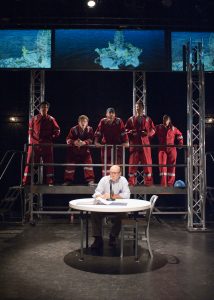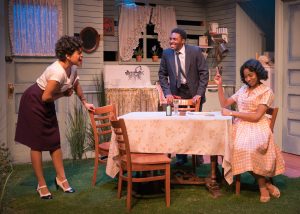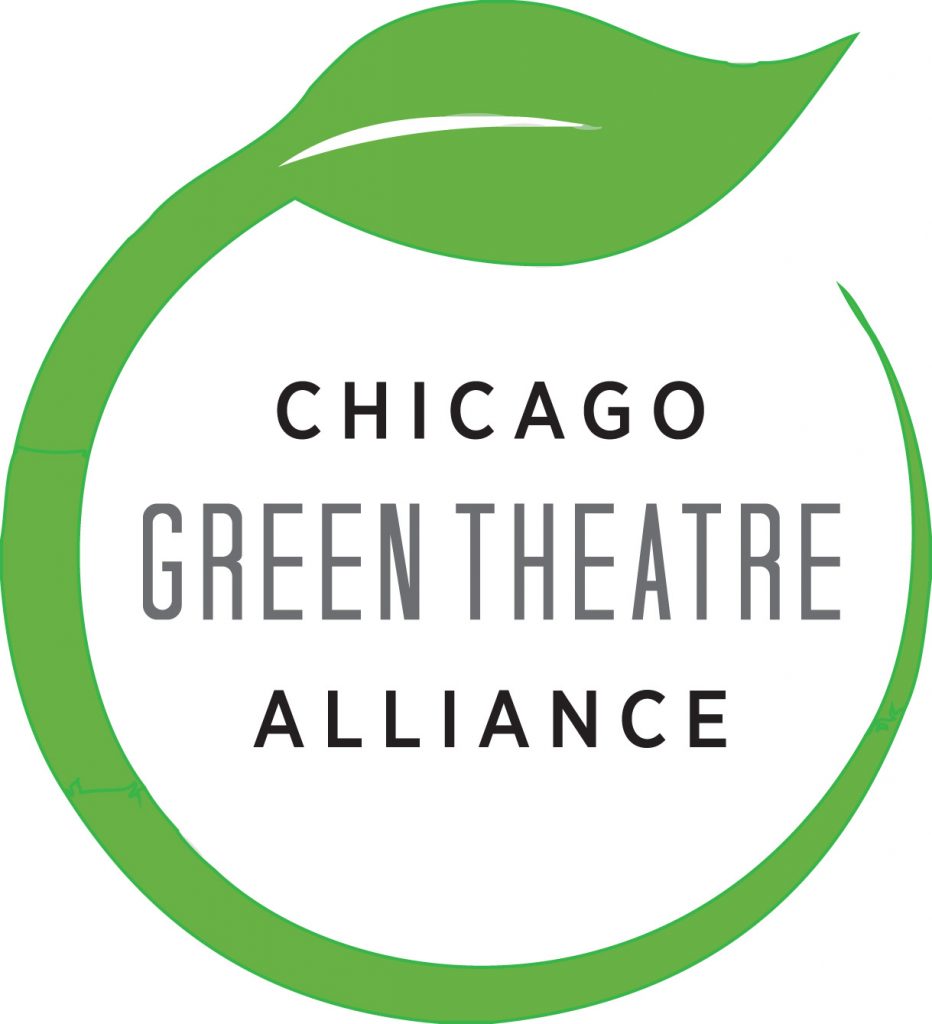TimeLine, a group of storytellers at heart, has been examining more closely the stories we tell—to ourselves and others. This means that we’re looking at the historical and present-day impacts of our choices and our resources. The push to uncover and to tell a different story has inspired me—both as a Production Manager and as an inhabitant of earth—to look at the story of sustainability and the impact that we have on the environment.
To this day, I love watching nature unfold before me. As a kid raised in the city of Chicago, I experienced “the environment” mostly on journeys outside of the city: rocky beaches with fish in the sandbars and fields of prairie grass with pollinating insects. The story went that these places were what was left of “the environment” that I needed to sustain and keep pristine. So, 10-year-old me planned to save it all from the horrors of the Industrial Revolution—the same revolution that also continued to keep me warm in my bed.

And since learning that story as a kid, it has taken me decades to change how I tell it.
One: The revolutions and “progress” in our white history books were not just discrete moments in time when native lands were desecrated and fossil fuel use accelerated, but are movements that continue to uphold white supremacy. Many millions of Black and Indigenous People have been used and abused, while generating the climate disaster we see before us today. And the harm is ongoing.
Two: The Black and Indigenous People, whose lives and land were stolen, were not only forced to share this “new environment,” but made to live in the waste. We can see that in our own city, manifesting in the Stop General Iron movement. White people have forced marginalized communities to make do with the harmed environments and have made them responsible for fixing the harm.
Three: While sustainability is a big word that is focused on how we meet the needs of everyone in the present AND consider our impacts on future generations, sustainable actions are small. The individual does matter. Individual choices matter. Everyone’s choices matter. A colleague at TimeLine has reminded me that it’s not up to the singular person to change our way of going about our daily lives, that organizations can and should make a difference. I agree, but also I know that power exists within every individual choice—that individuals can inspire collective action.
This is the story I’m trying to tell now—radically reformed from the bones of the story I was told as a kid—and it doesn’t stop here.
“What we do now becomes history by which our grandchildren will judge us”
– August Wilson, The Ground on Which I Stand
Recently, on an outside-the-city nature walk not unlike the journeys from my childhood, I watched a pair of birds traverse a small body of water. I saw these birds check in with each other as they moved through the air to ensure a safe flight. And they checked in again after they landed! I suddenly missed connection with the other members of my community, my industry, and my city. Like those birds, we’re all on a journey together through our environment. Before the pandemic, we were constantly checking in, figuring things out together, and collaborating.
How TimeLine Is Taking Action
TimeLine, through evolving work on our Strategic Plan, wants “to foster a collaborative environment where innovation and great work can happen.” We want to be like birds, naturally and intentionally, flying in the same direction. You can read the specific strategies that fall under this goal here …

The work is intersectional, and it will require many individual actions. To champion sustainability and create a better environment for everyone, it will take intentional collaboration. And in the spirit of open collaboration and keeping ourselves accountable, here is a glimpse of some of the tactics we want to implement to uplift that collaborative environment:
- Encourage feedback from all artists and collaborators by creating multiple pathways for feedback
- Give every production time and financial resources to consider the skills needed of designers, consultants, and officers before finalizing the budget and hiring these artists
- Reexamine the production schedule to make room for a sustainable work / life / sleep balance
- Examine where we are spending material budgets and research how we could spend those dollars in local and/or BIMPOC (Black, Indigenous, Multiracial, People(s) of Color) businesses.
- Commit to ethically and sustainably sourced materials (for example: shop local, shop BIMPOC businesses, shop eco-friendly)
- Create budgets that commit to spending more money on people than stuff
- Adjust hourly pay structures for equity across production departments
- Prioritize less energy consumption in current and future facilities
- Use our networks to spread the good/greener word:
- Nominate Green Captains for every production
- Circulate a Green Tip of the Day throughout the company
- Ensure all call boards and communications centers have Green Tips and ways to activate
- Use our public space and resources to improve recycling initiatives for staff, artists, and audiences:
- Advocate for reusable office supplies, double-sided printing, e-scripts
- Provide space for recycling hard-to-recycle items (light bulbs, batteries, e-waste, corks)
- Begin a public composting program
- Make signage that promotes and informs the public about our green initiatives
- Invest in the reuse of physical materials (like scenic pieces, costumes, and props)
- Share production resources with other local companies; grow the community through shared resources!
There will be more initiatives, more ideas, more deeply-felt ways to make our journey collaborative, innovative, and sustainable for all. We would like to share this journey with you, too. Do you have ideas or thoughts to help us make our shared environment better?
I hope you will accompany TimeLine as we create a new story of sustainability: supporting the people, our local vendors, and our ability to keep doing better as we move into the future environment.

TimeLine is a proud member of the Chicago Green Theatre Alliance.

Comments (3)
Clarice Hearne
Hello, Morag.
I congratulate you on your Greener Timeline Initiative. I look forward to future TimeLine productions.
Archibald Bryant
I enthusiastically support all of this and anxiously await your reopening plans. I am a 78 year old white male and hope I can resubscribe again.
Morag Fullilove
Thanks for bring your family along on this journey of re-use, re-cycle and refuse.